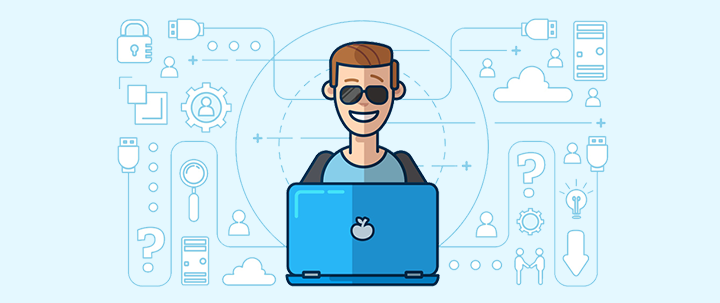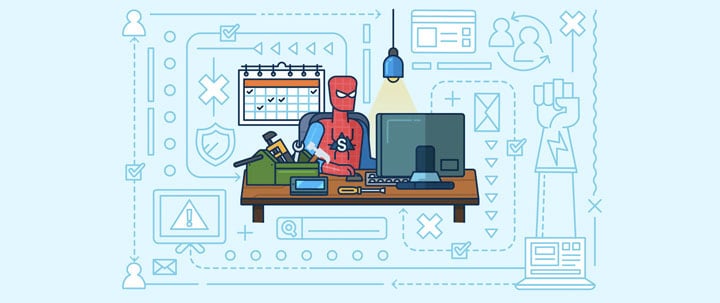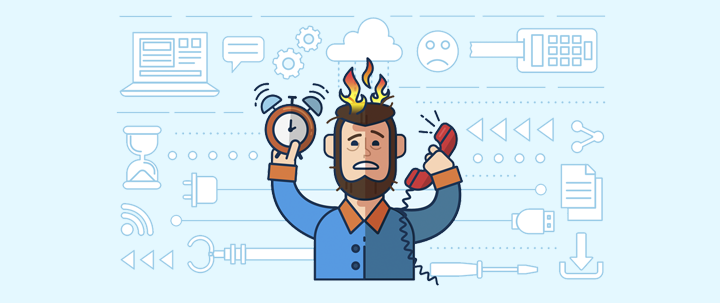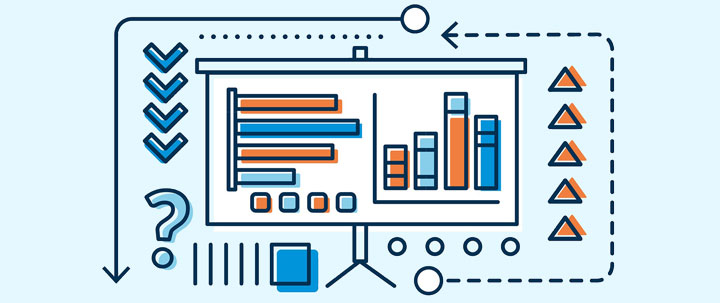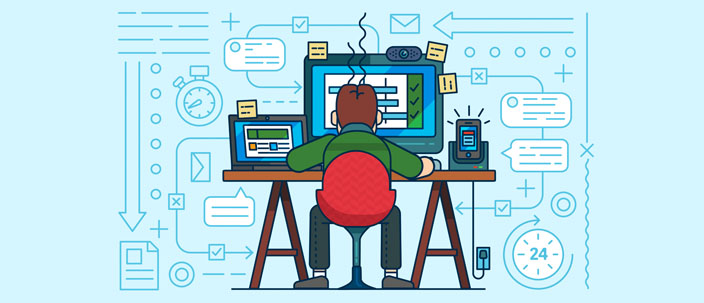Working an IT helpdesk can be very rewarding, but as we know, it may come with some hardships. The job can be stressful, and when that pressure is dealt with by working more hours or hastening your pace, you can quickly fall victim to physical and emotional exhaustion, also referred to as workplace burnout.
Signs of Workplace Burnout:
• Cynicism about your job
• Irritability and impatience with co-workers
• Low energy that results in inconsistent productivity
• Difficulty concentrating
• Dissatisfaction with achievements
• Overuse of caffeine, alcohol, or unhealthy foods to feel better
• Changes in sleep pattern
If you recognize any of these signs, you could be fighting the flames of burnout. To avoid getting burned, realign your physical and mental health with the demands of your job. Here’s how:
1. Set Boundaries
In life and business, healthy boundaries are critical to our mental and emotional stability. Taking your work home with you at the end of the day, accepting work calls on nights and weekends, unnecessarily saying yes to projects or tasks that will overload your schedule; these are all indications that you aren’t setting enough boundaries.
Tips:
• Learn the difference between what you can handle and what you should handle. Just because you can drive 150 mph doesn’t mean you should. The two are not the same.
• If you aren’t clear about your work responsibilities, set up a meeting and ask for clarification. You can’t set boundaries if you don’t understand where your job ends and where someone else’s begins.
• Practice saying “no”. Not in a knee-jerk sort of way, but a respectful, straightforward manner. Be genuine about the reason, but avoid “defending” your response. Finish the conversation by offering your colleague a lifeline in the form of advice or direction on where else they can go for help.
• Communicate your availability outside of the office and stick to it. Even if you receive emails or phone calls during your “off duty” time, refrain from the urge to answer. The moment you break your own boundary, you open the gates for everyone else to do the same.
2. Work Just as Hard for Happiness
In many cases, workplace burnout is the result of caring too much. Allow yourself to care equally as much about work as at being happy.
Tips:
• Sometimes, workplace burnout can mimic the symptoms of depression, causing you to withdraw from activities and people that once brought you joy. To break the cycle, make a list of hobbies you once enjoyed or activities you’ve always wanted to try — and commit to doing them.
• Schedule time for people and activities. Put them on your calendar to give them equal priority to work and don’t break your responsibility to yourself.
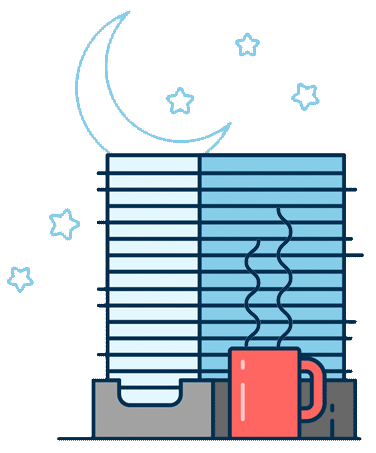
• Sometimes, we get so caught up in the race; we forget to consider whether or not we even enjoy running anymore. Ask yourself if this is the career path you want. If it isn’t, then you risk chronic workplace burnout and should consider making a change.
3. Adopt Healthier Habits
Self-care isn’t selfish; it’s vital. When you deprive your body of nutritious foods, water, sleep, and exercise, you force your critical operating systems to work in hyper mode to make up for the deficiencies. If your mind and body are working harder than they should, they’re likely going to burn out faster.
Tips:
• Start small. Set attainable goals, like eating a healthy breakfast every morning, drinking more water, or getting an extra hour of sleep each night. As you create a habit out of each goal, set another, and build your wellness one brick at a time.
• Incorporate more wholesome, nutritious foods into your diet. The adage, 'You are what you eat' might be obnoxiously cliche’, but it’s also incredibly accurate. Nearly every bit of food you consume gets turned into glucose, which provides your brain and body with the energy it needs to stay focused and alert.
• Take plenty of breaks throughout the day to move your body and mentally recharge. Go for a short walk at lunch. Stand up and practice deep breathing exercises. Find a quiet corner and try stretching or meditating. These acts of self-care are scientifically proven to enhance your mental capacity and stave off chronic illnesses associated with a sedentary lifestyle.
4. Invest in Your Work Relationships
The more support you have at the office, the less likely you are to crash and burn. If you do happen to burn out, a strong team will also help you recover more quickly.
Tips:
• Schedule time to socialize with your colleagues outside the office, like going out to lunch or meeting up for a happy hour. During that time, keep shop-talk to a minimum and, instead, build a connection based on common interests.
• Make a conscious effort to follow up with others on noteworthy events in their life.
• Be inclusive. Workplace clicks are a real struggle in some organizations, and unfortunately, they can have a terrible impact on someone’s work experience, including their likelihood of burning out.
5. Ask For Help
Working yourself to the point of exhaustion doesn’t make you the team’s MVP. More often, it results in mistakes, inconsistencies, and low-quality deliverables. In other words, you might be killing yourself for mediocrity. Asking for help can be incredibly hard for some people because we all struggle with the fear of rejection or appearing weak or incapable. The truth is, asking for help can be courageous and shows an admirable degree of self-awareness. Asking for help also indicates that you put your work and your team above your own pride.
Tips:
• Know precisely what you are asking, and provide as much necessary information to set your colleague up for success. Don’t “dump” the task on their desk. Follow up, and engage in the progress.
• Ask for help quietly, but thank your helper loudly. Praise goes a long way in the workplace. Those who go the extra mile to help out their colleagues deserve to be recognized. Recognition will also encourage others to pitch in and help next time.
• Don’t limit your selection of saviors. Help doesn’t just have to be in the form of a person; it can also be a software upgrade or a new tool that enables you to do your job more efficiently.
Take SherpaDesk, for example. By using a software solution that streamlines how you process tickets, manage projects, bill your time, and communicate with customers, you can save your energy for the critical aspects of your job instead of the details.
Ready to Get a Handle on Your Job?
Power your helpdesk with your Free Online SherpaDesk Support Desk Software.

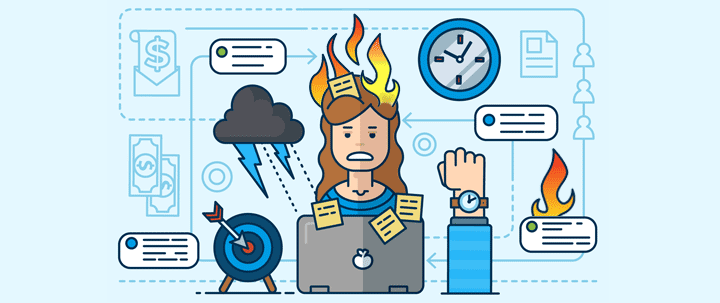

%201.png?width=559&height=559&name=close-up-women-working-with-devices%20(1)%201.png)


